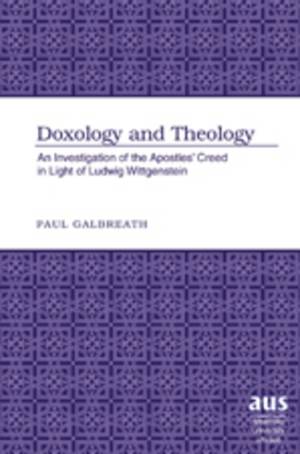
- Afhalen na 1 uur in een winkel met voorraad
- Gratis thuislevering in België vanaf € 30
- Ruim aanbod met 7 miljoen producten
- Afhalen na 1 uur in een winkel met voorraad
- Gratis thuislevering in België vanaf € 30
- Ruim aanbod met 7 miljoen producten
Zoeken
Doxology and Theology
An Investigation of the Apostles' Creed in Light of Ludwig Wittgenstein
Paul Galbreath
€ 91,95
+ 183 punten
Uitvoering
Omschrijving
This book, which developed from an understanding of the dialectical relationship between theology and the church, provides information about the function and domain of language in the church through an analysis of its creedal statements. The study begins with an historical investigation of the crisis in linguistic interpretation in the church and theological community. Subsequently, a philosophical framework is presented through an investigation of particularly significant aspects of Ludwig Wittgenstein's later writings. Following a discussion of the alternative readings of Wittgenstein by theologians, examples are presented for ways in which we can apply Wittgenstein's linguistic approach to the interpretation of creeds. After distinguishing optional approaches to the creeds, the book presents an understanding of creedal statements in light of Wittgenstein. Reclaiming the functional nature of doxological language within its liturgical context provides a central connection between the language of the church and the actions of its members.
Specificaties
Betrokkenen
- Auteur(s):
- Uitgeverij:
Inhoud
- Aantal bladzijden:
- 167
- Taal:
- Engels
- Reeks:
- Reeksnummer:
- nr. 285
Eigenschappen
- Productcode (EAN):
- 9781433101489
- Verschijningsdatum:
- 8/08/2008
- Uitvoering:
- Hardcover
- Formaat:
- Genaaid
- Afmetingen:
- 160 mm x 230 mm
- Gewicht:
- 379 g

Alleen bij Standaard Boekhandel
+ 183 punten op je klantenkaart van Standaard Boekhandel
Beoordelingen
We publiceren alleen reviews die voldoen aan de voorwaarden voor reviews. Bekijk onze voorwaarden voor reviews.











